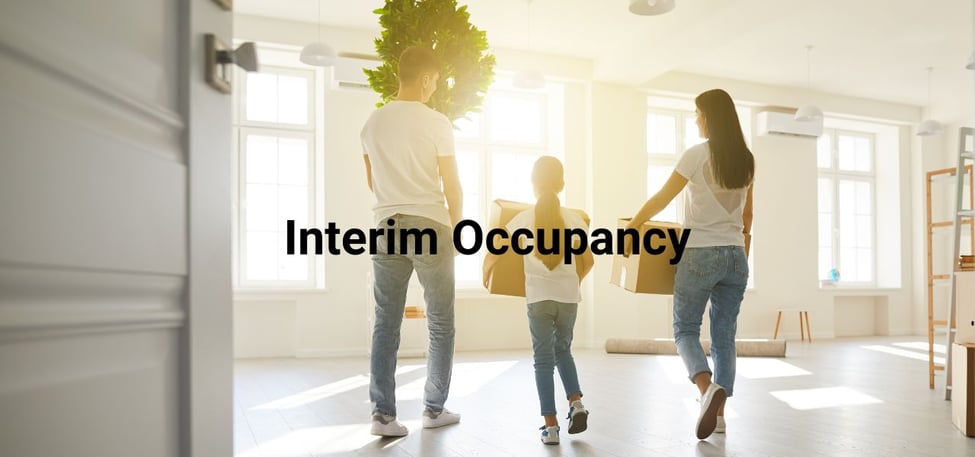What is Interim Occupancy?
As the excitement and anticipation build up when your new home is getting close to completion, there are one of the two things that can happen
- Interim occupancy or
- Final closing without interim occupancy
This blog discusses the first scenario.
Here are the 3 points to remember about interim occupancy or interim closing of your unit.
1. Building Not Finished
Even though your unit is ready to be occupied, the building might not be entirely complete. There may be other units that are not ready, some of the shared areas are still under construction and so on. This is your Interim Occupancy and it is the phase where you can live in your unit while other areas are being finished and the building is registered with the municipal government.
At this stage, your unit is fit for living, but the building isn't yet registered with the city as a Condominium Corporation.. The City issues an Occupancy Permit to confirm that your unit is safe to live in, but there's still work to be done elsewhere. In other words, the developer gives you the keys once your unit is ready, but they still own it. This period can last from a few weeks to a few months, depending on how quickly the rest of the building is completed and registered. Interim occupancy is not a given meaning that many times the builder will give you the possession of your unit once it is transferred on final closing. So no interim occupancy period in this case. There are scenarios where this happens such as your condo is on a higher floor or if it is a townhouse it gets completed closer to the registration date and there is not much gap between interim and final closing.
2. Occupancy Fees
This is the tricky part during interim occupancy: you have to pay interim occupancy fees, which is sometimes known as "phantom rent" or "phantom mortgage." What are these fees? Well, basically they're "rent" paid to the developer and it covers three main components:
First, Maintenance/Condo Fees which are what you pay as a share towards the costs of maintaining the building. During interim occupancy, this is based on the developer's proposed budget.
Second, Estimated Property Taxes: The taxes aren't officially assessed yet, so the developer collects an estimated amount, often around 1 to 1.5 percent of the purchase price.
And third, Interest on the Unpaid Balance: If you've put down a deposit, you still owe the remaining balance of the purchase price. The developer can charge interest on this amount, based on the Bank of Canada 1-year conventional mortgage rate.
These fees can add up regardless of whether you occupy the unit or not, so it's important to budget for them.
Interim occupancy is just the beginning. The end goal is the final closing, which brings us to our third point.
3. Final Closing
This happens when the building is registered with the city. The title in the property is transferred to you at a date that the builder communicates with you. At this final stage, you'll pay the remaining balance of the purchase price, through a mortgage or otherwise. You'll also pay the usual closing costs like development charges, utility connection fees, park levies, land transfer taxes, legal fees, and other costs.
Once everything is in place, the condo is yours!
Additional Considerations
What if you want to rent out your unit or do an assignment sale during interim occupancy? Since you don't own the unit yet, you can't just do whatever you want. To rent it out, you'll need permission from the developer.
If you want to assign it for any reason, you'll have to do an assignment and transfer your contract to another buyer. Make sure you get all necessary approvals to avoid complications. Watch one of my videos on assignments here to get a better understanding. You'll find the link here. Also, keep in mind that if you plan to rent out the unit, it could impact your HST rebate on final closing, since you'd now be considered an investor, not a resident. Consult with a lawyer or financial advisor on this. Interim occupancy can be a bit of a rollercoaster, but there are ways to manage it.
Here are a few tips: You can Increase Your Deposit: By paying a more deposit to the builder before taking possession, you can reduce the unpaid balance. This will lower the interest portion of your interim occupancy fees. Of course, paying the entire balance amount will save you interest payment to the builder completely but then that's a rare case.
Generally, units on higher floors have shorter or no interim occupancy period, which means lower fees. And if the developer allows renting during occupancy period then consider renting your unit can offset some or all of the fees. You will need to consider the potential complications if you are planning to move-in after final closing. Most likely you won't find someone to rent just for a couple of months.
Should you need to discuss purchasing of your pre-construction home in the Greater Toronto Area, give me a shout! You can reach me at 647-834-9928 or send an email to [email protected]
Thank you!

